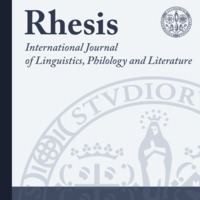
Rhesis UniCa
INTERNATIONAL JOURNAL OF LINGUISTICS, PHILOLOGY AND LITERATURE
DOUBLE BLIND – PEER REVIEWED | ISSN 2037-4569
Rhesis is an open access international journal that is divided into two streams:
Rhesis – Linguistics and Philology aims at publishing outstanding contributions in all subfields of functional linguistics that show a methodological orientation to the empirical verification of theories. It welcomes contributions in all empirically-oriented language studies with application to both classical and modern languages, and it devotes particular attention to theoretically-grounded studies in historical linguistics. It also welcomes philological studies focusing on either textual or cultural issues.
Rhesis – Literature welcomes contributions on both classical and modern literatures of the world, with a particular attention to critical innovation and interdisciplinary research. It features contributions on the diverse cultural manifestations of literature studies and related disciplines, with a special focus on hybridization and on the problematization of genres.
RHESIS Linguistics/Philology is published on a yearly basis in the month of June; RHESIS Literature is published in the month of December. Both issues will features research articles, review articles, research notes, and book reviews.
Authors:
For further information and details about submission of manuscripts, please consult the ‘Notes for Contributors’ section under either Linguistics/Philology or Literature. Contributions in English, French, German, Spanish and Italian are considered, but an abstract in English should always be included.
Readers:
Rhesis is an open access journal, thus a subscription fee is not required.
For more information, see the Journal's website:
https://rhesis.it/
Submission of contributions:
https://rhesis.it/submit-manuscript/
DOUBLE BLIND – PEER REVIEWED | ISSN 2037-4569
Rhesis is an open access international journal that is divided into two streams:
Rhesis – Linguistics and Philology aims at publishing outstanding contributions in all subfields of functional linguistics that show a methodological orientation to the empirical verification of theories. It welcomes contributions in all empirically-oriented language studies with application to both classical and modern languages, and it devotes particular attention to theoretically-grounded studies in historical linguistics. It also welcomes philological studies focusing on either textual or cultural issues.
Rhesis – Literature welcomes contributions on both classical and modern literatures of the world, with a particular attention to critical innovation and interdisciplinary research. It features contributions on the diverse cultural manifestations of literature studies and related disciplines, with a special focus on hybridization and on the problematization of genres.
RHESIS Linguistics/Philology is published on a yearly basis in the month of June; RHESIS Literature is published in the month of December. Both issues will features research articles, review articles, research notes, and book reviews.
Authors:
For further information and details about submission of manuscripts, please consult the ‘Notes for Contributors’ section under either Linguistics/Philology or Literature. Contributions in English, French, German, Spanish and Italian are considered, but an abstract in English should always be included.
Readers:
Rhesis is an open access journal, thus a subscription fee is not required.
For more information, see the Journal's website:
https://rhesis.it/
Submission of contributions:
https://rhesis.it/submit-manuscript/
less
Related Authors
Flavia Usai
Università Cattolica del Sacro Cuore (Catholic University of the Sacred Heart)
Lorenzo Sardone
Università degli Studi "La Sapienza" di Roma
Francesco Bertani
Università degli Studi di Torino
Alessio Faedda
Università degli Studi di Cagliari
Giulia Maltagliati
University of Cambridge
Enrico Medda
University of Pisa
Francesca Cau
University of Trento
Maurizio Trifone
Università degli Studi di Cagliari
Paolo Orrù
Università degli Studi di Cagliari
Roberta Caddeo
Università degli Studi di Bergamo (University of Bergamo)









Uploads
Call for papers by Rhesis UniCa
Linguistics and Philology aims at publishing outstanding contributions in all subfields of functional linguistics which show a methodological orientation to the empirical verification of theories. It welcomes contributions in all empirically-oriented language studies with application to both classical and modern languages, and it devotes particular attention to theoretically-grounded studies in historical linguistics. It also welcomes philological studies focussing on either textual or cultural issues.
Literature welcomes contributions on both classical and modern works of literature of the world, with particular attention to critical innovation and interdisciplinary research. It features contributions on the diverse cultural manifestations of literature studies and related disciplines, with a specific focus on hybridisation and on the problematization of genres.
Important dates
Both issues of Rhesis are published on a yearly basis.
Rhesis – Linguistics and Philology Submission date: 31st March (please fill in the form at https://rhesis.it/submit-manuscript/) Publication: 30th June
Rhesis – Literature Submission date: 30th September (please fill in the form at https://rhesis.it/submit-manuscript/) Publication: 31st December
Literature 11.2 by Rhesis UniCa
Linguistics 11.1 by Rhesis UniCa
Linguistics and Philology aims at publishing outstanding contributions in all subfields of functional linguistics which show a methodological orientation to the empirical verification of theories. It welcomes contributions in all empirically-oriented language studies with application to both classical and modern languages, and it devotes particular attention to theoretically-grounded studies in historical linguistics. It also welcomes philological studies focussing on either textual or cultural issues.
Literature welcomes contributions on both classical and modern works of literature of the world, with particular attention to critical innovation and interdisciplinary research. It features contributions on the diverse cultural manifestations of literature studies and related disciplines, with a specific focus on hybridisation and on the problematization of genres.
Important dates
Both issues of Rhesis are published on a yearly basis.
Rhesis – Linguistics and Philology Submission date: 31st March (please fill in the form at https://rhesis.it/submit-manuscript/) Publication: 30th June
Rhesis – Literature Submission date: 30th September (please fill in the form at https://rhesis.it/submit-manuscript/) Publication: 31st December
To this end, this study will follow two trajectories: on the one hand, it will illustrate Kipps’s deviation from the classic Bildungsroman on the structural and semantic levels, in which the values and ideals underlying the reference genre are reversed. On the other hand, it will examine the role of the emotion of shame in the three main phases of Kipps’s Bildung and the different traits that it assumes in the gradual emergence of a social reflection and a class consciousness in the protagonist’s experience. Being strictly related to the protagonist’s social ascent, shame involves both the social and the moral levels. As a social emotion, in this novel it implies social ranks and a real or internalised audience, while as a moral emotion it is crucial to the definition of the protagonist’s identity and to the acquisition of self-awareness through the comparison with the others. In terms of the reversal of the socialisation process expected by the traditional Bildungsroman, this analysis illustrates how the protagonist’s overcoming shame coincides with his distancing from the norm, from the class conventions that the novel emphasises and calls into question.
On the basis of the survey and analysis of all the Bc’s rūpakas and their supposed inspirational MBh source, the present inquiry tries to show how the singled-out cross-references are not only aimed at building a generic sophisticated literary pattern for his mahākāvya and his learned audience, but they are also intentionally targeted at evoking Epic heroic imagery as clues for the kingly commitment the author attributes to Buddha.
This peculiar poetical strategy is here probed by means of the reconstruction of the textual network of the occurrences of the term phena, meaning ‘foam, froth’, and their literary contexts. Aśvaghoṣa adopts this Sanskrit term, drawing it and the correlated imagery from the Brahmanical textual repertoire (Vedic corpus, and epics) and Buddhist scriptures (Pāli canon), so that multifaceted meanings referring to different codified literary languages are implied by the single term phena. However, an ultimate value emerges from Aśvaghoṣa’s works: it paradoxically fulfils and consummates the previous inconsistent meanings, since in the Buddhist perspective the evanescence of the foam prefigures the supreme awareness of unsubstantiality.
The present paper describes some forms of future tense in the Slavic of Molise (SLM), a Croatian minority language in contact with Romance varieties of Southern Italy. On the basis of the data collected in two SLM communities, the role of the Romance contact languages in the evolution of the different forms of future tense is highlighted. Three forms of future tense that have a model in Italian and in the dialect variety of the region have been added to the periphrasis with the auxiliary ‘want’ brought from the Balkan area of origin: a periphrastic form with the auxiliary ‘have’ / ‘have to’, the form of the present indicative, and an imminential periphrasis with the verb ‘stand’. However, this system is not stable: the change in the use of the varieties of the linguistic repertoire (both by communities and by single speakers) modified the functional distribution of the forms of future tense. The aim of the present work is to describe the current conditions of use of the different forms of future tense and to provide an explanation to the ongoing process of change.
Starting from Lacan’s theory on the gaze, this article analyses how the traumatic scene observed by the younger sister, unbeknownst to the elder, serves as a mythopoetic device and it is at the origin of the mise en abîme on which the Chinese box structure of the novel stands. The repetitions of the trauma – first with the furtive reading of an obscene letter addressed to the older sister and then with the love scene in the library – mark the gradual prevailing of the imaginary on the real, until the final discovery of the fictionality of the whole story.
This paper aims to introduce the director’s vision of the source play and of its possible dramaturgical improvements as a further reason behind the blurred boundary between translation and adaptation in theatre. Rumori fuori scena, the Italian version of Michael Frayn’s Noises Off, serves as the case study for a contrastive analysis which, in addition to the source text and its published translation, analyses the script currently being staged. The words of the translator and of the professionals involved are then essential to understand the practice of theatrical translation in all its steps, in order to truly devise a comprehensive theoretical framework of the issues involved in the operation.
The study wants to set itself as a starting point for an overall analysis on the theme of the economic and (neo)liberal discourse in the media and in Italian politics. The corpus collected for this first survey includes articles of national newspapers published between August 2007 and July 2017, thus covering a vast period of time. The corpus is composed of about 300 thousand articles from 6 national newspapers (Corriere della Sera, Repubblica, La Stampa, Il Sole 24 Ore, MilanoFinanza) for a total of over 200 million words.
The analysis will combine a series of quantitative and qualitative techniques; we refer here to the now consolidated field of study of Corpus Assisted Discourse Studies (Partington 2004). In the present paper we will focus on the description of some particularly salient social actors (the markets, the ECB, the workers) and on the concept of social class.
In this study, following a description of the contexts in which Sardinian and Italian are used, the most frequent phonetic, morphologic and lexical variations – pertaining both standard and less traditional vocabulary – will be analysed together with the impact of Italian language on speaker knowledges and competences, taking into consideration the most important sociolinguistic variables, in particular age, gender, education and profession.